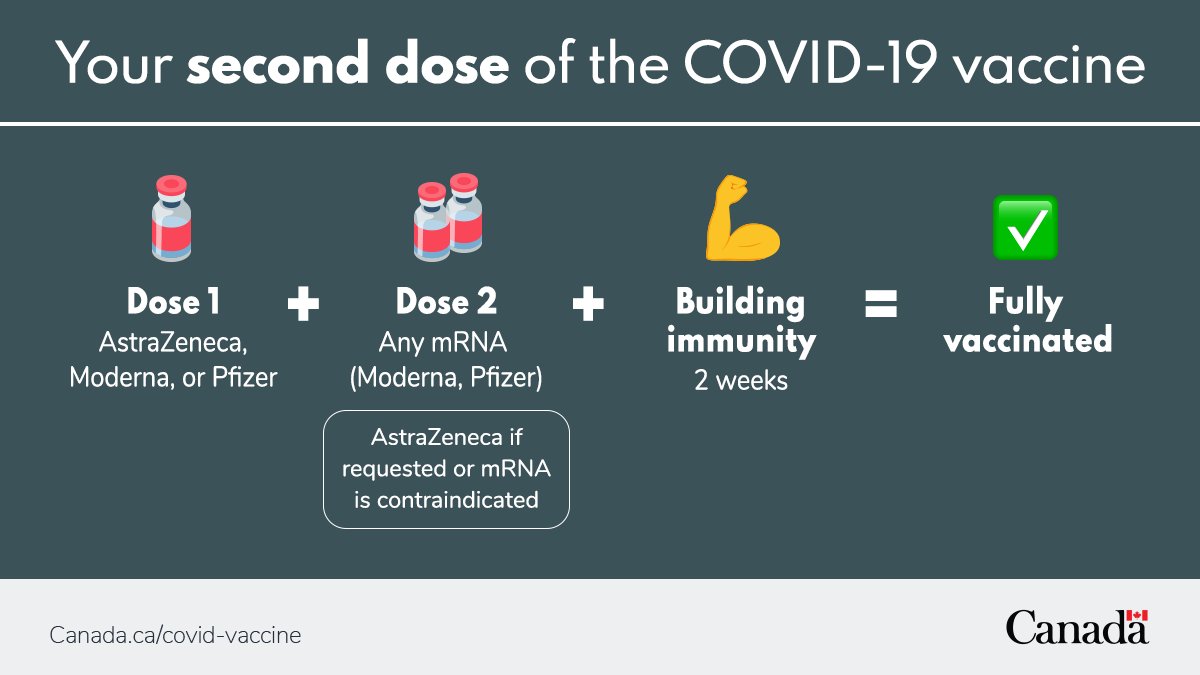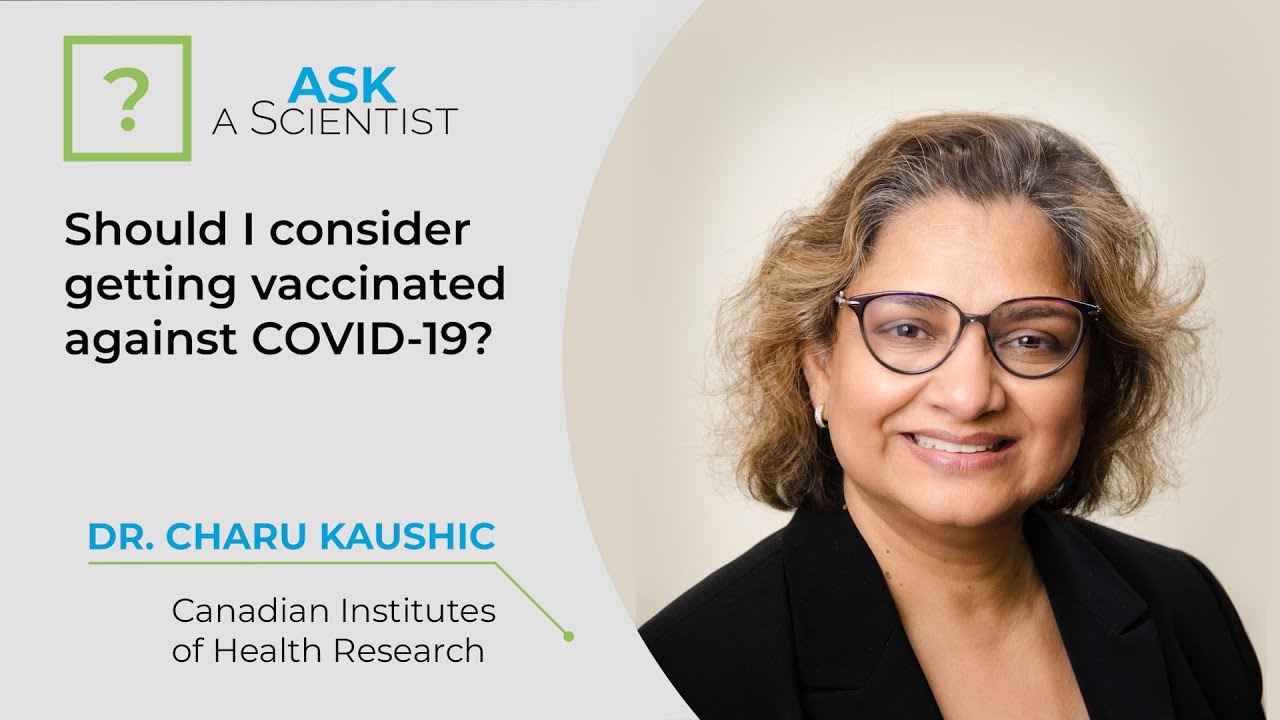The benefits of getting vaccinated against COVID-19
The big question
Should I consider getting vaccinated against COVID-19?
The quick answer
Yes, all eligible people in Canada should consider getting vaccinated against COVID-19.
By getting vaccinated, you are helping to protect yourself—and likely those around you—from the virus that causes COVID-19.
A vaccine is like a training exercise for your immune system. It gives your body the chance to develop antibodies and other protective factors to build up its defenses against the virus. And the vaccine does all of this without actually exposing your body to the real virus or risking real infection.
That's the huge benefit of vaccination: You get the protection without the disease.
And while no protection (including vaccination) is 100% perfect, the good news is that vaccination drastically reduces your risk of being infected, even if you get exposed to the virus later on. Plus, studies are consistently showing that fully vaccinated individuals who do contract COVID-19 are far less likely than non-vaccinated people to experience severe illness, require hospitalization, or die from the disease.
Individual vaccination is also part of our collective effort to stop the spread of COVID-19. When you get vaccinated and reduce your own risks—and especially when your friends, family members, neighbours, and colleagues do the same—your protection contributes to the protection of your whole community.
The longer story
Vaccines are designed to prevent severe illness, which is why they are often heralded as a marvel of modern medicine. As the old saying goes, an ounce of prevention is worth a pound of cure.
In the case of COVID-19, there is no cure for the disease, but the approved vaccines have proven to be very effective at preventing severe illness. That makes them one of the best tools we have against the pandemic.
But I feel fine!
Vaccines are part of the prevention side of medicine (preventive medicine), which sometimes causes confusion. Many of us associate taking medicine with being sick—so, if you're not sick, you don't need the vaccine (medicine), right? Wrong! Vaccines help protect you from getting sick in the first place.
This confusion about the important role that preventive medicine plays in maintaining good health has led to some unfortunate misinformation about who should get vaccinated against COVID-19 (read more about that below).
Just remember: a vaccine is not like fixing something that isn't broken—it's quite the opposite! A vaccine is medicine that you take when you are healthy in order to help you stay healthy.
How does a vaccine protect me from COVID-19?
Vaccines are designed to train your immune system to recognize and fight a specific pathogen (germ). For COVID-19, that pathogen is SARS-CoV-2 (the virus that causes the disease).
This training—which you could also think of as prep work or a practice round—is important because it gives your body a significant advantage over the virus. It tells your immune system what specific threat to look for and what to do about it.
Now, would your immune system eventually figure it out if you got infected (and didn't get vaccinated)? Probably. But it would take time, and that's time that the virus would use to replicate (make copies of itself) inside your body. In that case, it's the virus that has the advantage because it is catching your immune system by surprise. And while your immune system takes the time to mount a proper defense, the illness could become severe.
In this way, the vaccine is like a head start.
It's a very different head start than, say, being physically fit or otherwise in good health. Healthy living is important whenever possible, but it is not the same as equipping your immune system to deal with a new pathogen because no aspect of healthy living can do the precise prep work of a vaccine.
The vaccine, and the immunity you develop after vaccination, is very specific. It prepares your immune system for this specific intruder and this specific fight. There is no food you can eat, no product you can buy, and no exercise you can do to achieve the same effect.
Only a vaccine works like a vaccine.
We know this thanks to decades of research in the areas of infectious disease and the immune system.
What does all of this mean for you? It means that if you are eligible and a “good candidate” (see below), you should consider getting vaccinated against COVID-19 to give yourself the best possible protection from the disease. Whether you are young, not-so-young, an elite athlete or not, the vaccine will give your body a layer of protection that it would not otherwise have.
There are some common side effects after vaccination (temporary fatigue, soreness, fever, etc.) and some rare-but-serious reactions that can occur (sometimes called "adverse events"). It's a good idea to read about these issues before your vaccine appointment so that you can know what to expect. Don't hesitate to talk to your health care provider if you have questions or concerns.
It is also worth noting that a very small percentage of people will not be good candidates for vaccination, usually due to a severe allergy to a component of the vaccine or due to some health conditions. In these cases, it is best to speak with your health care provider about what your next steps should be.
What do the vaccines mean for my community?
Vaccination is an individual choice, but it's also a cooperative action.
How does herd immunity work?
Contagious diseases, like COVID-19, spread from person to person.
That means that if someone gets sick, they can pass it on to other people. And then those people can pass it on, and so on and so on. As long as that pattern is allowed to continue, the disease will be able to circulate in the community.
But if enough people in the community (the “herd”) have some immunity against the disease, then the pattern can be broken. Learn more
In addition to the very small percentage of the population who will not be good candidates for vaccination, there are people in our communities who simply might not be able to produce a robust immune response after receiving the vaccine. People on immunosuppressant drugs—such as those who have received organ transplants, for example—and people who are otherwise immunocompromised aren't likely to be as protected by vaccination, at least not at the individual level. For others, the vaccine might not be approved for use in their age group (yet).
But everyone deserves to be protected from COVID-19, regardless of their health status or age.
This is where the impact of all those individual vaccination choices can really add up. It's the concept of "herd immunity" (sometimes called "population/community immunity" or "herd protection"). Basically, the people who cannot be vaccinated or develop robust immunity on their own end up benefiting from the indirect protection that others provide. It's a phenomenon that has been studied with many contagious diseases.
Let's look at how this can play out in real life.
Vaccination drastically reduces a person's risk of being infected with the virus that causes COVID-19. In other words, they are less susceptible to infection. This is great news for the individual (and bad news for the virus) because it means they are "harder" to infect. This is great news for the community, too, because if that person doesn't get infected, then they can't pass the virus on to someone else.
Now imagine a community full of people who are hard to infect. The virus will find it increasingly difficult (although not impossibleFootnote 1) to hitch a ride, which means it won't be able to spread as easily. By reducing the spread of the disease so efficiently, those hard-to-infect individuals have actually made things safer for the people do not have immunity against the virus themselves.
When am I fully vaccinated?
To get the full protection of vaccination, it's important to complete what is called the vaccine series. For most approved COVID-19 vaccines in Canada, the vaccine series consists of two vaccine dosesFootnote 2. That means that you need two doses to truly reap the benefits outlined above.
Two weeks after you complete your vaccine series, you can count yourself as being fully vaccinated.
Clinical trial data and real world studies have repeatedly shown that both doses of a two-dose vaccine series are needed for stronger, more reliable protection against the virus that causes COVID-19 (including variants of concern). Don't skip that second shot!

Long description
Text illustrated in a mathematical addition equation format: Your second dose of the COVID-19 vaccine. Dose 1 (AstraZeneca, Moderna, or Pfizer) plus dose 2 (any mRNA – Moderna, or Pfizer – AstraZeneca if requested or mRNA is contraindicated, plus building immunity (2 weeks) equals fully vaccinated.
Related reading
- Vaccinated against COVID-19? What does it mean to me? (Public Health Agency of Canada)
- Reported side effects following COVID-19 vaccination in Canada (Public Health Agency of Canada)
- Date modified:
